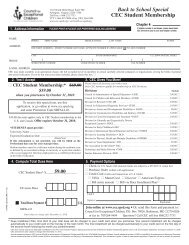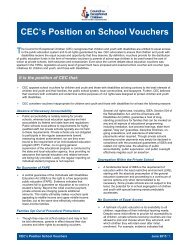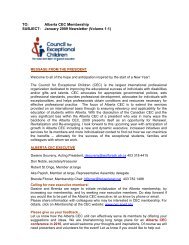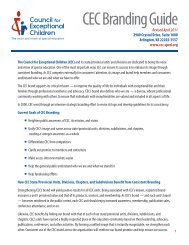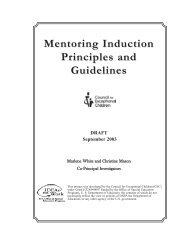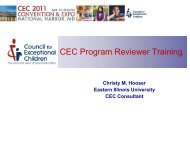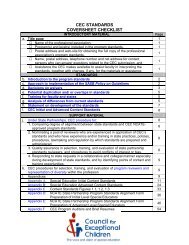What Every Must Know Special Educator - Council for Exceptional ...
What Every Must Know Special Educator - Council for Exceptional ...
What Every Must Know Special Educator - Council for Exceptional ...
Create successful ePaper yourself
Turn your PDF publications into a flip-book with our unique Google optimized e-Paper software.
After mastering initial special education professional<br />
standards, many special educators continue their<br />
professional growth toward mastery of advanced<br />
professional standards at the postbaccalaureate levels,<br />
including masters, specialists, and doctoral degree<br />
programs, as well as nondegree advanced certificate<br />
programs. For some, this means deepening their<br />
understanding and expertise and adding new responsibilities<br />
<strong>for</strong> leadership within the classroom. Some<br />
special educators choose to specialize their knowledge<br />
<strong>for</strong> educating individuals with a given disability,<br />
age-range or functional area. Others work toward assuming<br />
functions outside the classroom, moving<br />
into specializations, administering special education<br />
programs and services, or moving into teacher preparation<br />
and research roles.<br />
At the advanced level, special educators share an array<br />
of functions and responsibilities. Reflecting this<br />
commonality, CEC has validated knowledge and skills<br />
that all special educators have mastered as a part of<br />
their preparation <strong>for</strong> advanced practice (see following<br />
Validated Advance Common Core <strong>Know</strong>ledge and<br />
Skill Set). The knowledge and skill sets are organized<br />
under six Advanced Content Standards (ARCS) that<br />
broadly describe in rich narrative what is expected<br />
of special educators preparing <strong>for</strong> an advanced role.<br />
Programs preparing special educators <strong>for</strong> advanced<br />
roles should ensure that their programs coordinate<br />
with the six ARCS as in<strong>for</strong>med by the knowledge<br />
and skill sets. Although the six ARCS provide a rich<br />
narrative focus and organizing heuristic, CEC has<br />
validated specific knowledge and skills sets <strong>for</strong> each<br />
of the roles that differentiate the emphasis, focus, and<br />
contextualized skills <strong>for</strong> each role. These validated<br />
knowledge and skill sets in<strong>for</strong>m and differentiate the<br />
specific skills and contextual expertise expected in the<br />
various roles. Programs preparing special educators<br />
<strong>for</strong> an advanced special education role 10 should use<br />
the appropriate knowledge and skills set(s) within the<br />
152 what every SPecial educator MuSt <strong>Know</strong><br />
advanCed Content StandardS<br />
development of the preparation programs to in<strong>for</strong>m<br />
the program’s curriculum of study and to design the<br />
program assessment plan.<br />
CEC uses the ARCS to organize the reviews of advanced<br />
preparation programs in partnership with<br />
the National <strong>Council</strong> <strong>for</strong> the Accreditation of Teacher<br />
Education (NCATE). Moreover, the six ARCS coordinate<br />
with the organized framework used by the<br />
National Board <strong>for</strong> Professional Teaching Standards<br />
across the five <strong>Exceptional</strong> <strong>Educator</strong> pathways. This<br />
makes it reasonable <strong>for</strong> programs that prepare NBPTS<br />
candidates to address the CEC ARCS.<br />
Similar to the 10 CEC <strong>Special</strong> Education Content<br />
Standards <strong>for</strong> initial roles, these 6 <strong>Special</strong> Education<br />
Advanced Roles Content Standards are identical<br />
across advanced special education roles. Each<br />
Standard is based on validated knowledge and skills<br />
in the Advanced Common Core <strong>Know</strong>ledge and Skill<br />
Sets. In addition, each specific advanced role will have<br />
knowledge and skills specific to that role.<br />
Advanced Standard 1: Leadership and<br />
Policy 11<br />
<strong>Special</strong> educators in advanced programs learn to use<br />
their deep understanding of the history of special<br />
education, current legal and ethical standards, and<br />
emerging issues to provide leadership. <strong>Special</strong> educators<br />
promote high professional self-expectations<br />
and help others understand the needs of individuals<br />
with exceptional learning needs. They advocate <strong>for</strong><br />
educational policy based on solid evidence-based<br />
knowledge to support high quality education <strong>for</strong><br />
individuals with exceptional learning needs. As appropriate<br />
to their role, they advocate <strong>for</strong> appropriate<br />
resources to ensure that all personnel involved have<br />
effective preparation. <strong>Special</strong> educators use their<br />
knowledge of the needs of different groups in a<br />
10 Both initial and advanced special education professional content standards are the basis <strong>for</strong> recognizing quality special education preparation<br />
programs and <strong>for</strong> developing special educator licensure frameworks. The initial special education professional standards provide a benchmark<br />
that jurisdictions can use to ensure that licensed beginning special educators can practice safely and effectively. The advanced standards<br />
provide a benchmark to ensure that experienced special education professionals are able to practice at an accomplished level of skill. <strong>Every</strong><br />
special educator should use the special education professional standards in guiding their own professional growth and development.<br />
Initial special education professional content standards describe the minimal knowledge, skills, and dispositions necessary <strong>for</strong> individuals to<br />
enter initial practice safely and effectively as a special education professional.<br />
Advanced special education professional content standards describe the knowledge, skills, and dispositions necessary <strong>for</strong> individuals to<br />
practice at accomplished levels of special education and in advanced special education roles. After previously mastering initial special<br />
education professional standards, special educators work toward mastery of advanced professional standards at the post baccalaureate levels,<br />
including masters, specialists, and doctoral degree programs, as well as nondegree advanced certificate programs.<br />
11 The bolded phrases are important elements of the standards identified to provide guidance to per<strong>for</strong>mance-based program developers.



